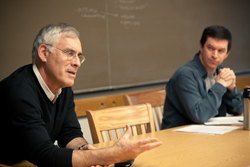
IRIS login | Reed College home Volume 96, No. 2: June 2017
National Insecurity
In a lecture that might have been titled "The Best Laid Plans of Mice and Men," Former Secretary of the Navy Richard Danzig '65 challenged the premises underlying America's policies on national security.
Speaking in Vollum lecture hall November 8 as part of the Public Policy Lecture Series (audio or video version), Danzig noted that both Reed College and the national security establishment put their eggs in a rational thought basket. This can lead to trouble as rational thought has poor predictive capabilities.
Citing the example of designing army tanks, Danzig said there is a 10 to 20 year lag between imagining scenarios in which a tank may be used and its subsequent manufacture. Tanks currently used in Afghanistan were designed in the 1980s when the predictive future involved the Soviet Union breaking through the Fulda Gap in Germany. Those tanks have a high fuel demand, which is problematic in Afghanistan where supplies are routed through Pakistan or Kazakhstan.
"If you look at our success in anticipating the word as it might exist 20 to 40 years from now, it is remarkably low," Danzig observed. No one in 1986, for example, would have predicted the break up of the Soviet Union, that we'd fight two wars in Iraq, or that China and not Japan would be the dominant Asian power. No one talked seriously about the Internet and the phenomenon of terrorism as we experience it wasn't anticipated.
Policy decisions are hampered by the inability to predict the future or escape the past, Danzig said. Those charged with instituting future policy defend the interests of their home institutions. The resulting, consensus product offers coalition participants a rationale for their own programs.
"Appearing to present strategic possibilities gives you a clarion call to defend your propositions to the world," Danzig said. "If you can articulate this way, you have an advantage in the world, as the Reed graduate knows. It's the ability to state the case with some clarity."
The psychological comfort of a belief in logic only carries us so far.
"In many respects we are like the people who practiced medicine in the 19th century," Danzig said. "When we recommend the surgery of warfare we have only a partial concept of the societies in which we're intervening, and what may happen or how things may metastasize."
Expect the unexpected, he advised, and avoid conclusions that are highly dependent on particular predictions. Logical propositions have masked presumptions smuggled into their assumptions.
A more positive outcome is likely when one begins to ask the right questions.
"How do you design a tank when you know that you don't know how you will use it?" Danzig asked. "Once you ask that question you liberalize some constraints and generate a whole different set of answers. In my mind it's the right question, and it's a very different questions from 'how do I predict the world of 20 years from now and design a tank to fit that world?'"
Finally, there is the impossibility of factoring in the chaos theory. Take the case of the Florida Butterfly Ballot in which the ballot in Palm Beach County placed the name of Pat Buchanan on a line with that of Al Gore.
"Two-thousand elderly Jewish women in that county voted for Buchanan, beyond the number of people that voted for Buchanan in any other place," Danzig said. "It was clearly a ballot error. Because of the butterfly ballot, George Bush was elected in Florida. Forget whether it was good or bad, it's very hard to think that Al Gore would have brought us into Iraq. Maybe he would have and part of my proposition is you don't really know, but I think it's very unlikely. So what have we got? The limited visual acuity of the woman designing the ballot in Florida causes the United States to invade Iraq."
Earlier this year, Reed awarded Danzig the first Thomas Lamb Eliot Award for Lifetime Achievement by a Reed College Graduate. During the Clinton administration Danzig served as Secretary of the Navy. He is the chairman of the board for the Center for a New American Security; a member of the RAND Corporation's board of trustees and of the Defense Policy Board, a federal advisory committee to the U.S. Department of Defense. He holds degrees in political science from Reed, a Bachelors of Philosophy and a Doctor of Philosophy from Oxford University, where he was a Rhodes Scholar, and a JD from Yale Law School. He was a law clerk to Supreme Court Justice Byron White, taught at both Harvard and Stanford, and spent two years as a member of the Harvard Society of Fellows. During the 2008 presidential campaign, he served as a senior adviser to Senator Barack Obama.



LATEST COMMENTS
steve-jobs-1976 I knew Steve Jobs when he was on the second floor of Quincy. (Fall...
Utnapishtim - 2 weeks ago
Prof. Mason Drukman [political science 1964–70] This is gold, pure gold. God bless, Prof. Drukman.
puredog - 1 month ago
virginia-davis-1965 Such a good friend & compatriot in the day of Satyricon...
czarchasm - 4 months ago
John Peara Baba 1990 John died of a broken heart from losing his mom and then his...
kodachrome - 7 months ago
Carol Sawyer 1962 Who wrote this obit? I'm writing something about Carol Sawyer...
MsLaurie Pepper - 8 months ago
William W. Wissman MAT 1969 ...and THREE sisters. Sabra, the oldest, Mary, the middle, and...
riclf - 10 months ago